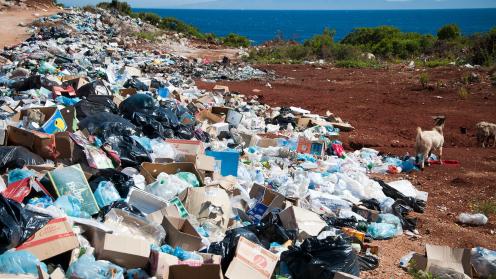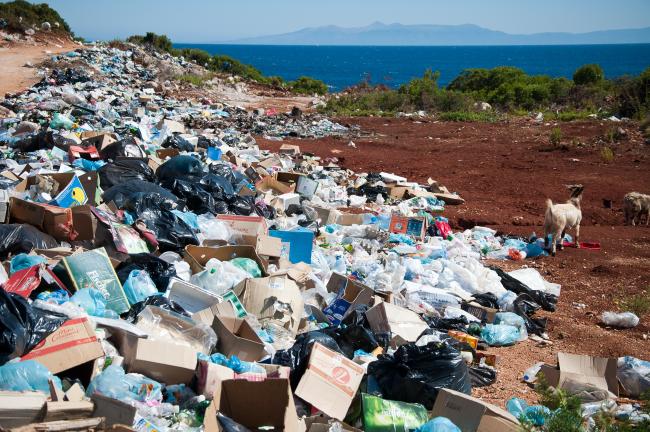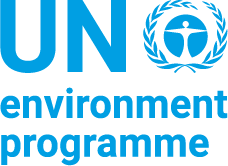About
Delegates worked to develop proposals for the establishment of the science-policy panel to contribute to the sound management of chemicals and waste, and the prevention of pollution. Discussions focused on: scope, functions, operating principles, and conflict of interest; institutional arrangements and relationships with key stakeholders; and work-related processes and procedures.
Final report
Summary report 9–15 December 2023
All coverage
“Everyone on this planet should be able to live and work without fear of falling sick or dying from chemical exposure. Nature, free from pollution, should be able to thrive and support humanity for millennia to come.” So said Inger Andersen, Executive Director of the UN Environment Programme (UNEP), at the Fifth International Conference on Chemicals Management (ICCM5), highlighting the urgency of addressing the sound management of chemicals.
While the notion of the triple planetary crisis gains traction, many argue that chemicals, waste, and pollution have not received the same level of attention as climate change and biodiversity loss. In an effort to address this gap, ICCM5 adopted, in a historic decision, the “Global Framework on Chemicals – For a planet free of harm from chemicals and waste,” in Bonn, Germany, in September 2023. The framework is structured around 28 targets and outlines a roadmap to address the lifecycle of chemicals, including products and waste.
Furthermore, contrary to climate change and biodiversity, there is currently no global science-policy panel that broadly addresses chemicals, waste, and pollution. An institutionalized science-policy interface will not only provide the appropriate interaction between scientists and policymakers, but also raise awareness, build capacities, and identify emerging issues, all of which are of paramount importance.
The fifth meeting of the UN Environment Assembly (UNEA-5), in 2022, recognized that improving the availability of scientific information and assessments can enable more effective and efficient action to minimize and prevent the negative impacts of chemicals and waste, and prevent pollution to improve human well-being. UNEA resolution 5/8 called for establishing a new science-policy panel to contribute to the sound management of chemicals and waste and prevention of pollution. This panel could support countries in their efforts to implement multilateral environmental agreements and other international instruments, promote the sound management of chemicals and waste, and address pollution by providing policy-relevant scientific advice to decision makers.
There are already science-policy bodies with specific mandates linked to multilateral environmental agreements on chemicals, waste, and pollution. They tend to have narrower mandates, such as screening chemicals to determine if specific chemicals are persistent organic pollutants (POPs) should be listed under the Stockholm Convention. The contribution of these bodies has been valuable, creating networks of scientists and advancing knowledge. The new science-policy panel is to complement, but not duplicate, them.
To establish this panel, UNEA agreed to convene an Open-ended Working Group to prepare proposals for the science-policy panel with the ambition to complete its work by the end of 2024. The first meeting of the working group was held in two parts. The first part took place on 6 October 2022 in Nairobi, Kenya, and virtually, and featured operational decisions and opening statements. The second part was held in-person in Bangkok, Thailand, from 30 January – 3 February 2023 and focused on the panel’s scope and functions as well as on capacity building. Delegates agreed on a list of elements that will have to be negotiated and adopted in order to establish the panel, including, among other things, rules of procedure, institutional arrangements, and processes for adopting assessments.
The second meeting of the working group will focus on the proposals for the establishment of the science-policy panel, specifically:
- scope, objectives, functions, and operating principles;
- capacity building;
- the panel’s governance, including plenary, membership, subsidiary bodies, secretariat, and financial arrangements; and
- relationship with relevant key stakeholders
The meeting is also expected to discuss modalities around determining and executing the panel’s work programme. These include procedures for review and adoption of reports, arrangements for identifying and engaging with experts, and addressing potential conflicts of interest.
The second meeting of the Ad Hoc Open-ended Working Group on a Science-Policy Panel to contribute further to the sound management of chemicals and waste and to prevent pollution will be held from 11-15 December 2023 in Nairobi, Kenya. Informal consultations, technical briefings, and regional and other groups’ preparatory meetings will take place on Saturday and Sunday, 9-10 December 2023.
The Earth Negotiations Bulletin (ENB) writers for this meeting are Asterios Tsioumanis, Ph.D.; Deborah Davenport, Ph.D.; Tallash Kantai; and Moritz Petersmann. The Digital Editor is Anastasia Rodopoulou. The Editor is Pamela Chasek, Ph.D.
View past and future events
Past event
1st Meeting of the UNEP Open-ended Committee of Permanent Representatives (OECPR-1)
Past event
UNEA-1
Past event
2nd Meeting of the UNEP OECPR
Past event
UNEA-2
Past event
UNEA-3
Past event
1st Meeting of the Ad Hoc Open-Ended Expert Group on Marine Litter and Microplastics
Past event
Negotiation of the Summary for Policy Makers of the 6th Global Environment Outlook (GEO-6)
Past event
4th Meeting of the OECPR and 4th Session of UNEA
Past event
2nd Global Session UN Science-Policy-Business Forum on the Environment
Past event
4th Meeting of the Ad-hoc Open-ended Expert Group on Marine Litter and Microplastics (AHEG-4)
Past event
Global Major Groups and Stakeholders Forum (GMGSF)
Past event
Youth Environment Assembly (YEA)
Past event
5th Meeting of the Open-Ended Committee of Permanent Representatives to UNEP (Online Session)
Past event
UN Science-Policy-Business Forum on the Environment (2021)
Past event
UNEA-5 (Online Session)
Past event
Inaugural Regional Session of the UNEP Science-Policy-Business Forum for Asia and the Pacific (AP-SPBF 2021)
Past event
Online Global Major Groups and Stakeholders Forum (GMGSF)
Past event
Youth Environment Assembly 2022
Past event
UNEA-5.2, OECPR-5.2 and UNEP@50
Past event
2nd UNEA Cities and Regions Summit
Past event
UNEA Flagship Side Events
Past event
Big Data for the Planet Breakfast and Ministerial Dialogue: The Next 50 Years
Past event
OEWG1: Science-Policy Panel to Contribute Further to the Sound Management of Chemicals and Waste and to Prevent Pollution
Past event
OEWG1-2: Science-Policy Panel to Contribute Further to the Sound Management of Chemicals and Waste and to Prevent Pollution
Past event
2nd Meeting of the Ad Hoc Open-ended Working Group on a Science-Policy Panel to Contribute Further to the Sound Management of Chemicals and Waste and to Prevent Pollution
Past event
UNEA-6 and OECPR-6
Past event
Global Major Groups and Stakeholders Forum (GMGSF) at UNEA-6
Past event
UN Science-Policy-Business Forum on the Environment Special Sessions at UNEA-6
Past event
3rd Meeting of the Ad Hoc Open-ended Working Group on a Science-Policy Panel to Contribute Further to the Sound Management of Chemicals and Waste and to Prevent Pollution
To receive free coverage of global environmental events delivered to your inbox, subscribe to the ENB Update newsletter.


